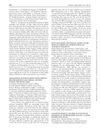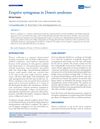 7 citations,
January 2012 in “Dermatology”
7 citations,
January 2012 in “Dermatology” Most hospitalized internal medicine patients have undiagnosed skin problems and want them treated.
[object Object]  7 citations,
January 2021 in “Dermatology and therapy”
7 citations,
January 2021 in “Dermatology and therapy” Both dermatologists and patients in Japan agree that treatment success for alopecia areata is having 20% or less scalp hair loss.
 6 citations,
April 2015 in “Behavioural Brain Research”
6 citations,
April 2015 in “Behavioural Brain Research” Finasteride worsens stress effects on sensory processes, possibly linking to anxiety/depression.
 6 citations,
May 2017 in “InTech eBooks”
6 citations,
May 2017 in “InTech eBooks” Hair loss can cause serious mental health problems and treating it requires a team of experts.
 5 citations,
July 2017 in “Skin appendage disorders”
5 citations,
July 2017 in “Skin appendage disorders” A man got a rare rash from the drug topiramate, which went away after he stopped taking it.
 4 citations,
May 2019 in “Physiology & Behavior”
4 citations,
May 2019 in “Physiology & Behavior” Cocaine impairs male sexual behavior and alters testosterone metabolism in the brain.
3 citations,
April 2022 in “Research Square (Research Square)” PBX1 reduces aging and cell death in stem cells by boosting SIRT1 and lowering PARP1.
 3 citations,
July 2012 in “Indian Journal of Psychological Medicine”
3 citations,
July 2012 in “Indian Journal of Psychological Medicine” Olanzapine helped a man who thought he had bugs on his skin.
 3 citations,
June 2021 in “Journal of affective disorders”
3 citations,
June 2021 in “Journal of affective disorders” Hair cortisol and cortisone levels may affect how work stress influences depression in Chinese fishermen.
 2 citations,
May 2021 in “Molecules”
2 citations,
May 2021 in “Molecules” A new method was created to analyze certain chemicals in the urine of alopecia areata patients, revealing they have higher metanephrine content. This method can also be used for other related diseases.
 2 citations,
August 2020 in “Cosmetics”
2 citations,
August 2020 in “Cosmetics” Herbal formula shows promise for hair loss treatment.
 2 citations,
January 2019 in “Elsevier eBooks”
2 citations,
January 2019 in “Elsevier eBooks” Biotin supplements are unnecessary for most people but may help with certain conditions like biotin deficiency, brittle nails, and some hair loss.
 2 citations,
October 2004 in “Drug Information Journal”
2 citations,
October 2004 in “Drug Information Journal” The conclusion is that combining social and cultural factors with pharmaceutical research could improve our understanding of how drugs work.
 1 citations,
August 2023 in “Frontiers in immunology”
1 citations,
August 2023 in “Frontiers in immunology” Traditional Chinese medicinal foods may help manage long-term post-COVID symptoms.
 1 citations,
January 2019 in “Elsevier eBooks”
1 citations,
January 2019 in “Elsevier eBooks” Neuroactive steroids may affect the risk and treatment of alcohol use disorders.
 1 citations,
November 2018 in “Therapeutic Delivery”
1 citations,
November 2018 in “Therapeutic Delivery” New partnerships, clinical trials, and drug approvals marked progress in therapeutic delivery in July 2018.
 April 2024 in “Lasers in medical science”
April 2024 in “Lasers in medical science” Near-infrared LED light improves skin rejuvenation and hair growth better than white LED light.
[object Object]  March 2024 in “Cleveland Clinic journal of medicine”
March 2024 in “Cleveland Clinic journal of medicine” Alpha-blockers and 5-alpha reductase inhibitors are main treatments for BPH, with new support for phosphodiesterase-5 inhibitors and beta-3 agonists.
 January 2024 in “International journal of pharmaceutical sciences review and research”
January 2024 in “International journal of pharmaceutical sciences review and research” Indian jujube has many medicinal properties and can help treat ailments like diabetes, inflammation, and cancer.
 January 2024 in “Theranostics”
January 2024 in “Theranostics” Exosomes from special stem cells help treat ulcerative colitis by reducing inflammation and stress.
 November 2023 in “Research Square (Research Square)”
November 2023 in “Research Square (Research Square)” Finasteride affects the male rat brain by reducing certain protein activation, but these effects may reverse after stopping the drug.
 May 2023 in “Journal of Pharmaceutical Research”
May 2023 in “Journal of Pharmaceutical Research” Neem is highly beneficial for health and beauty with no major side effects.
 December 2021 in “Innovation in aging”
December 2021 in “Innovation in aging” Frailer men have a higher risk of worsening prostate problems and serious health events needing hospital care.
 September 2021 in “International journal of Ayurveda and pharma research”
September 2021 in “International journal of Ayurveda and pharma research” Ayurvedic treatment improved hypothyroidism in a 30-year-old man.
 February 2021 in “Journal of nursing education and practice”
February 2021 in “Journal of nursing education and practice” Women and men experience different quality of life and symptom distress after kidney transplant with immunosuppressive therapy.
 January 2021 in “bioRxiv (Cold Spring Harbor Laboratory)”
January 2021 in “bioRxiv (Cold Spring Harbor Laboratory)” Mothers have more hair proteins than their children, with age-related differences in protein patterns, and some proteins in hair could indicate early childhood development.
 November 2020 in “Elsevier eBooks”
November 2020 in “Elsevier eBooks” Antiandrogens and androgen inhibitors like spironolactone, finasteride, and dutasteride can treat hair loss and skin conditions, but they have risks and side effects, including potential harm to pregnant women and risks of cancer and heart issues. Herbal remedies also have antiandrogenic effects but lack safety validation.
 January 2019 in “Przegląd Dermatologiczny”
January 2019 in “Przegląd Dermatologiczny” An 87-year-old woman was diagnosed with type 3 autoimmune polyendocrine syndrome and had multiple autoimmune issues.
 April 2018 in “Nasza Dermatologia Online”
April 2018 in “Nasza Dermatologia Online” People with Down's syndrome are more likely to have syringomas.
 September 2017 in “Pediatric Dermatology”
September 2017 in “Pediatric Dermatology” The document concludes that an experimental drug may help wound healing in Epidermolysis Bullosa, links Hydroa vacciniforme to EBV, discusses diagnosing hair loss disorders, finds many children with eczema have allergies, reviews the safety of a skin medication in children, notes side effects of a Duchenne's treatment, and identifies a marker for pediatric mastocytosis.





























